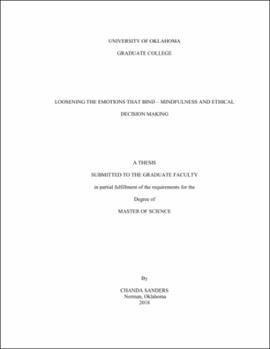| dc.contributor.advisor | Buckley, Michael | |
| dc.contributor.author | Sanders, Chanda | |
| dc.date.accessioned | 2018-08-06T16:00:07Z | |
| dc.date.available | 2018-08-06T16:00:07Z | |
| dc.date.issued | 2018-07-24 | |
| dc.identifier.uri | https://hdl.handle.net/11244/301373 | |
| dc.description.abstract | Research has shown that negative emotions can influence the decision-making process and contribute to unethical behavior. It was hypothesized that mindfulness would decrease negative emotions and reduce their impact in the decision-making process compared to cognitive reappraisal, thereby resulting in less cheating on an anagram task. Participants were asked to complete ten days of emotion regulation techniques in mindfulness, cognitive reappraisal, or were given no training prior to data collection where the emotions of frustration, anger, or no emotion were elicited before engaging in the trained emotion regulation exercise. Participants completed an anagram task and self-scored and reported results via an online survey system. Results were tested with the Carbonless Anagram Method (CAM), where we found no significant difference between groups. Reasons for lack of findings and future directions are discussed. | en_US |
| dc.language | en_US | en_US |
| dc.subject | Mindfulness | en_US |
| dc.subject | Ethical Decision Making | en_US |
| dc.subject | Emotions | en_US |
| dc.title | Loosening the Emotions that Bind - Mindfulness and Ethical Decision Making | en_US |
| dc.contributor.committeeMember | Connelly, Shane | |
| dc.contributor.committeeMember | Terry, Robert | |
| dc.date.manuscript | 2018-07-24 | |
| dc.thesis.degree | Master of Science | en_US |
| ou.group | College of Arts and Sciences::Department of Psychology | en_US |
| shareok.orcid | 0000-0003-0433-3710 | en_US |
